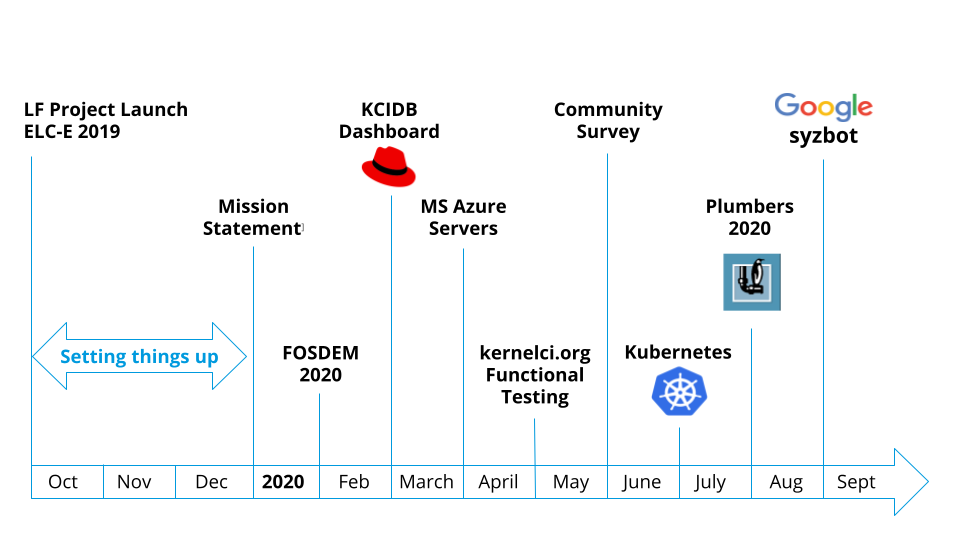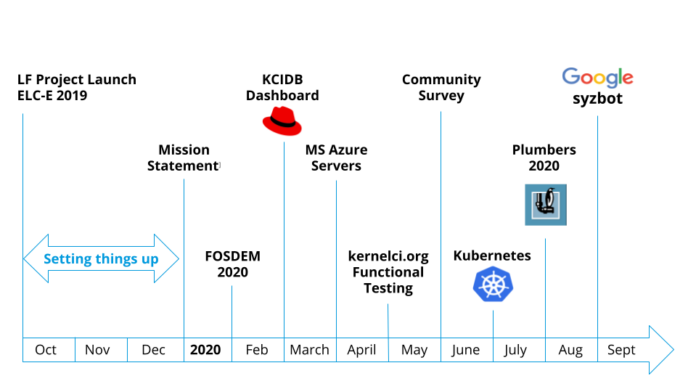In this article, an existing Ansible playbook is used to deploy Vim and convert it to a role adding flexibility and reusability.
Read More at Enable Sysadmin
8 steps to developing an Ansible role in Linux
SEAPATH: A Software Driven Open Source Project for the Energy Sector
LF Energy recently announced a new project called, SEAPATH, or Software Enabled Automation Platform and Artifacts (THerein). It’s the second project by the foundation in its Digital Substation Automation Systems (DSAS) initiative. SEAPATH will provide a reference design and a real-time, open-source platform for grid operators to run virtualized automation and protection applications. In this interview, Dr. Shuli Goodman, Executive Director of LF Energy, and Lucian Balea, R&D Program Director and open source manager at RTE joined Swapnil Bhartiya to talk about the project.
Linux Foundation Support for Asian Communities
The Linux Foundation and its communities are deeply concerned about the rise in attacks against Asian Americans and condemn this violence. It is devastating to hear over and over again of the attacks and vitriol against Asian communities, which have increased substantially during the pandemic.
We stand in support with all those that have experienced this hate, and to the families of those who have been killed as a result. Racism, intolerance and inequality have no place in the world, our country, the tech industry or in open source communities.
We firmly believe that we are all at our best when we work together, treat each other with respect and equality and without hate or vitriol.
The post Linux Foundation Support for Asian Communities appeared first on Linux Foundation.
A brief introduction to Ansible Vault
Ansible Vault is an Ansible feature that helps you encrypt confidential information without compromising security.
Read More at Enable Sysadmin
Cloud Native Training & Certification from The Linux Foundation & CNCF
There’s no question that cloud computing skills are in demand, and knowing cloud can help you secure a lucrative career. In fact, the 2020 Open Source Jobs Report from The Linux Foundation and edX found that knowledge of cloud skills has the biggest impact on hiring decisions. LinkedIn also named cloud computing the second most in demand hard skill of 2020. And a recent D2iQ study found “only 23% of organizations believe they have the talent required to successfully complete their cloud native journey”.
Closing this talent gap is why Linux Foundation Training & Certification has partnered with the Cloud Native Computing Foundation (CNCF) – the home of Kubernetes, Linkerd, Prometheus, Helm and other widely used cloud native technologies – on a variety of programs to make quality cloud native learning more accessible. The hope is that providing more educational opportunities will lead to a great ability for those aspiring to work in the field to do so.
This article examines the various training courses available to learn about cloud native technologies, as well as certification exams to demonstrate that knowledge. Sample learning paths are also included as a guide of how to get started, and how to proceed on the cloud native learning journey.
Free Training Courses
Our catalog of free cloud native courses is offered on the non-profit edX platform, and provides the fundamentals necessary to move on to more advanced training. These courses are all taken online and are self-paced. Note you can audit each course at no cost for between six and fourteen weeks depending on the course, so we recommend completing each course you are interested in before moving on to the next to ensure you do not run out of time.
- Introduction to Cloud Infrastructure Technologies (LFS151) – This class is designed for people who have little or no prior experience with cloud technologies. Upon completion, students will possess an understanding of cloud computing and the use of open source software to maximize development and operations.
- Introduction to Kubernetes (LFS158) – This course is for teams considering or beginning to use Kubernetes for container orchestration who need guidelines on how to start transforming their organization with Kubernetes and cloud native patterns.
- Introduction to Service Mesh with Linkerd (LFS143) – This course is designed for site reliability engineers, DevOps professionals, cluster administrators, and developers and teaches them to use the Linkerd CLI and UI to deploy and operate Linkerd, as well as to secure, observe, and add reliability to Kubernetes applications.
- Introduction to Serverless on Kubernetes (LFS157) – The course is designed for developers and IT operators, and explains how a serverless approach works in tandem with a Kubernetes cluster, along with the potential of serverless functions.
- Exploring GraphQL: A Query Language for APIs (LFS141) – This course is for both management and technical teams involved in the building and management of websites and provides the skills to get started using GraphQL for a small project or professionally in production.
- Building Microservice Platforms with TARS (LFS153) – This course is designed for engineers working in microservices, as well enterprise managers interested in exploring internal technical architectures, and helps them to understand microservices architecture and how to quickly build stable and reliable applications based on TARS.
- Introduction to Cloud Foundry and Cloud Native Software Architecture (LFS132) – This course is for teams that either use or would like to use Cloud Foundry to deploy applications, preparing them to deliver business value quickly, without wasting time getting apps to the cloud.
- Introduction to FinOps (LFS175) – This course is addressed to a wide audience including technical professionals, finance, procurement, and accounting professionals, business unit or product managers, and executives, helping them understand how to build a culture of accountability around cloud use that lets your organization make good, timely, data-backed decisions in the cloud, not just to save money, but to make money.
eLearning Courses
Self-paced, eLearning courses provide a way to learn intermediate to advanced skills in a low pressure environment. These courses are offered for a fee and include access for a full year. Some courses can also be bundled with a certification exam for a discounted price.
- Containers Fundamentals (LFS253) – This course provides the knowledge needed to work with containers to bundle an application with all its dependencies and deploy it on the platform of our choice, be it Bare-Metal, VM, Cloud, etc.
- Kubernetes Fundamentals (LFS258) – This course provides a strong operating knowledge of Kubernetes, including how to deploy a containerized application and manipulating resources via the API. It also serves as preparation for the Certified Kubernetes Administrator (CKA) exam.
- Kubernetes for Developers (LFD259) – This course is ideal for developers who are looking to gain skills in Kubernetes application development. It also serves as preparation for the Certified Kubernetes Application Developer (CKAD) exam.
- Monitoring Systems and Services with Prometheus (LFS241) – This course leads new Prometheus users through many of its major features, best practices, and use cases. It covers aspects including setting up and using Prometheus, monitoring components and services, querying, alerting, using Prometheus with Kubernetes and more.
- Cloud Native Logging with Fluentd (LFS242) – This course explores the full range of Fluentd features, from installing Fluentd to running Fluentd in a container, and from using Fluentd as a simple log forwarder to using it as a sophisticated log aggregator and processor.
- Service Mesh Fundamentals (LFS243) – This course introduces the challenges of distributed systems, strategies for managing these challenges, and the architecture of service meshes. It also covers key concepts such as data plane vs. control plane and the evolution of ingress.
- Managing Kubernetes Applications with Helm (LFS244) – This course covers the history of the Helm project and its architecture, how to properly install the Helm client, the various components of a Helm chart and how to create one, the command-line actions used for managing an application’s lifecycle, and much more.
- Containers for Developers and Quality Assurance (LFD254) – This course can help everyone involved in the application lifecycle, be it developers, quality assurance engineers, or operations engineers, by preparing them to deploy a containerized application in production from a workstation.
- Kubernetes Security Essentials (LFS260) – This course provides the knowledge and skills needed to maintain security in dynamic, multi-project environments. It also serves as preparation for the Certified Kubernetes Security Specialist (CKS) exam.
- Cloud Foundry for Developers (LFD232) – This course teaches developers how to use Cloud Foundry to build, deploy and manage a cloud native microservice solution. It also serves as preparation for the Cloud Foundry Certified Developer (CFCD) exam.
- DevOps and SRE Fundamentals: Implementing Continuous Delivery (LFS261) – This course introduces the fundamentals of CI/CD within an open container ecosystem, explaining how to deliver features rapidly, while at the same time being able to achieve non-functional requirements such as availability, reliability, scalability, security, and more.
Instructor-Led Training Courses
Instructor-led training is ideal for teams or for those who need hands-on support to gain the skills needed for a job role. These courses take place either in person or virtually at a pre-scheduled time, with a live instructor leading.
- Kubernetes Administration (LFS458) – This course is ideal for those wishing to manage a containerized application infrastructure. This includes existing IT administrators, as well as those looking to start a cloud career. It also serves as preparation for the Certified Kubernetes Administrator (CKA) exam.
- Kubernetes for App Developers (LFD459) – This course will teach you how to containerize, host, deploy, and configure an application in a multi-node cluster. It also serves as preparation for the Certified Kubernetes Application Developer (CKAD) exam.
- Kubernetes Security Fundamentals (LFS460) – This course provides skills and knowledge across a broad range of best practices for securing container-based applications and Kubernetes platforms during build, deployment, and runtime. It also serves as preparation for the Certified Kubernetes Security Specialist (CKS) exam.
Certification Exams
Our certification exams demonstrate that an individual possesses the skills to be effective in a given cloud-native role. Most exams are performance-based, presenting tasks to be completed in a real-world environment. Upon passing the exam, you receive a certificate and digital badge which can be independently verified at any time by current or potential employers using our online verification tool.
- Certified Kubernetes Administrator (CKA) – A certified K8s administrator has demonstrated the ability to do basic installation as well as configuring and managing production-grade Kubernetes clusters. They will have an understanding of key concepts such as Kubernetes networking, storage, security, maintenance, logging and monitoring, application lifecycle, troubleshooting, API object primitives and the ability to establish basic use-cases for end users.
- Certified Kubernetes Application Developer (CKAD) – A k8s certified application developer can design, build, configure and expose cloud native applications for Kubernetes, as well as define application resources and use core primitives to build, monitor, and troubleshoot scalable applications and tools in Kubernetes.
- Certified Kubernetes Security Specialist (CKS) – Obtaining a CKS demonstrates a candidate possesses the requisite abilities to secure container-based applications and Kubernetes platforms during build, deployment and runtime, and is qualified to perform these tasks in a professional setting.
- Cloud Foundry Certified Developer (CFCD) – CFCD is ideal for candidates who want to validate their skill set using the Cloud Foundry platform to deploy and manage applications.
- FinOps Certified Practitioner (FOCP) – A FOCP will bring a strong understanding of FinOps, its principles, capabilities and how to support and manage the FinOps lifecycle to manage cost and usage of cloud in an organization.
Other Resources
- Kubernetes.io Getting Started Documentation
- Kubernetes.io Tutorials
- Interactive Cloud Native Landscape
- CNCF Webinars
Sample Learning Paths
- Cloud Administrator
- Cloud Engineer
- Kubernetes Fundamentals (LFS258)
- Certified Kubernetes Administrator (CKA)
- Kubernetes for Developers (LFD259)
- Certified Kubernetes Application Developer (CKAD)
- Monitoring Systems and Services with Prometheus (LFS241)
- Cloud Native Logging with Fluentd (LFS242)
- Service Mesh Fundamentals (LFS243)
- Managing Kubernetes Applications with Helm (LFS244)
- Containers for Developers and Quality Assurance (LFD254)
- Or complete the Advanced Cloud Engineer Bootcamp
- Cloud Architect
- All from the above Cloud Engineer list, plus:
- Exploring GraphQL: A Query Language for APIs (LFS141)
- Building Microservice Platforms with TARS (LFS153)
- Introduction to Serverless on Kubernetes (LFS157)
- Cloud Security Specialist
The post Cloud Native Training & Certification from The Linux Foundation & CNCF appeared first on Linux Foundation – Training.
KernelCI: Looking back, looking forward

2020 was the first year of the KernelCI project under the Linux Foundation and has been an interesting one. Maybe slightly less “interesting” than the rest of the world-changing events of 2020, but it’s still been an adventure. This article aims to give a quick summary of the major milestones of the first year of KernelCI project, and highlight our goals for the next year.
Read the original post on the KernelCi blog.
Installing and configuring Jenkins in Linux
Jenkins provides CI/CD functionality, making sysadmin and developer lives easier. See how to install and set up this useful service.
Read More at Enable Sysadmin
Certified Hyperledger Fabric Developer (CHFD) Exam Has Relaunched
The Certified Hyperledger Fabric Developer (CHFD) exam, which initially launched a year ago and enables candidates to demonstrate the knowledge to develop and maintain client applications and smart contracts using the latest Fabric programming model, is once again available for scheduling. The exam had been paused pending updates of the exam content to align with the most recent Long Term Support (LTS) version of Fabric, v2.2.
Holding this certification provides confidence to supervisors and hiring managers that a team member or job candidate possesses the necessary skills to package and deploy Fabric applications and smart contracts, perform end-to-end Fabric application life-cycle and smart contract management, and more. The CHFD exam platform is Node.js for both Client Application and Smart Contract.
As with other Linux Foundation certification exams, CHFD can be taken remotely from a candidate’s home or workplace. Candidates can choose from an English or Japanese speaking proctor who will verify the candidate’s identity and monitor them during the exam via webcam – the exam questions are available in both English and Japanese within the exam environment. The two-hour exam is an online, performance-based test that consists of a set of tasks or problems to be solved in a Web IDE and the command line.
CHFD and CHFD-JP are available for immediate registration. For those needing assistance preparing for the exam, the LFD272 – Hyperledger Fabric for Developers training course is also available and covers topics such as how to implement and test a chaincode in Golang for any use case, manage the chaincode life cycle, create Node.js client applications interacting with Hyperledger Fabric networks, control access to the information based on a user identity, set up and use private data collections and much more.
The post Certified Hyperledger Fabric Developer (CHFD) Exam Has Relaunched appeared first on Linux Foundation – Training.
Getting into the weeds with Buildah: The buildah unshare command
Using buildah unshare to script the management of container images in rootless mode.
Read More at Enable Sysadmin
Generating a Software Bill of Materials (SBOM) with Open Source Standards and Tooling
Every month there seems to be a new software vulnerability showing up on social media, which causes open source program offices and security teams to start querying their inventories to see how FOSS components they use may impact their organizations.
Frequently this information is not available in a consistent format within an organization for automatic querying and may result in a significant amount of email and manual effort. By exchanging software metadata in a standardized software bill of materials (SBOM) format between organizations, automation within an organization becomes simpler, accelerating the discovery process and uncovering risk so that mitigations can be considered quickly.
In the last year, we’ve also seen standards like OpenChain (ISO/IEC 5320:2020) gain adoption in the supply chain. Customers have started asking for a bill of materials from their suppliers as part of negotiation and contract discussions to conform to the standard. OpenChain has a focus on ensuring that there is sufficient information for license compliance, and as a result, expects metadata for the distributed components as well. A software bill of materials can be used to support the systematic review and approval of each component’s license terms to clarify the obligations and restrictions as it applies to the distribution of the supplied software and reduces risk.
Kate Stewart, VP, Dependable Embedded Systems, The Linux Foundation, will host a complimentary mentorship webinar entitled Generating Software Bill Of Materials on Thursday, March 25 at 7:30 am PST. This session will work through the minimum elements included in a software bill of materials and detail the reasoning behind why those elements are included. To register, please click here.
There are many ways this software metadata can be shared. The common SBOM document format options (SPDX, SWID, and CycloneDX) will be reviewed so that the participants can better understand what is available for those just starting.
This mentorship session will work through some simple examples and then guide where to find the next level of details and further references.
At the end of this session, participants will be on a secure footing and a path towards the automated generation of SBOMs as part of their build and release processes in the future.
The post Generating a Software Bill of Materials (SBOM) with Open Source Standards and Tooling appeared first on Linux Foundation.


